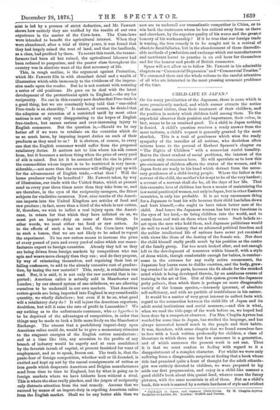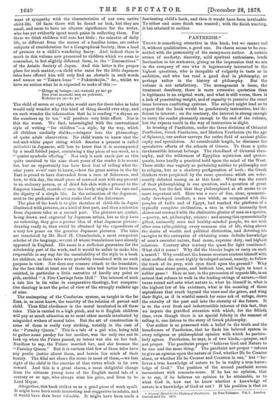CHILD-LIFE IN JAPAN.*
OF the many peculiarities of the Japanese, there is none which is more prominently marked, and which sooner attracts the notice of the casual visitor, than their treatment of their children, and the position in society which children hold among them. To the superficial observer their position and importance, their callus, in fact, seems to be an unmixed good. To a child in Japan nothing is denied. A child's question receives a ready answer from the most taciturn, a child's request is generally granted by the most churlish. This is a trait of gentleness which wins the ready sympathy of the traveller of all nations, who doubtless often returns home to the perusal of Herbert Spencer's chapter on "The Rights of Children" with a somewhat rueful humility. But to the closer student of social problems, the interest of the question only commences here, lie will speculate as to how this pre-eminence of children affects the status of the women, and in Japan facts are ready to his hand which detract from the neces- sary gentleness of a child-loving people. Where the father is the servant of the child, the mother's lot is apt to be of the very hardest; a servant of a servant shall she be, all the days of her life. That this excessive love of children has been a means of maintaining the low social position:of women, not only in Japan, but in other Eastern countries, is only too probable. It is no very uncommon thing for a Japanese to beat his wife because their child has fallen down and hurt himself,—she ought to have taken better care of the child. And hence the Japanese woman has but two functions in the eyes of her lord,—to bring children into the world, and to nurse them and wait on them when they come. Such beliefs re- act upon the men who hold them, and Japanese politicians would do well to read in history that an advanced political freedom and the nobler intellectual life of nations have never yet coexisted with views like these of the destiny of the female sex. Nor does the child himself really profit much by his position as the centre of the family group. Far too much looked after, and not enough left to the development of resources within himself, with a style of dress which, though comfortable enough for babies, is cumber- some in the extreme for any really active amusement, the Japanese boy learns soon to dislike exertion, and the body, grow- ing crooked in all its parts, becomes the fit abode for the crooked mind which is being developed therein, by an assiduous course of training in the art of lies. Out of this system grows the Japanese petty yakunin, than which there is perhaps no more disagreeable variety of the human species,—intensely ignorant, of absolute self-sufficiency, and with no particle of truthfulness in his nature.
It would be a matter of very great interest to collect facts with regard to the connection between the child-life of Japan and its adult social institutions and social manners,—and this is what, when we read the title-page of the work before us, we hoped had been done by a competent observer. For Mrs. Chaplin Ayrton has resided for some time in Japan, has studied the language, and has always interested herself much in the people and their habits. It was, therefore, with some chagrin that we found ourselves face to face with a book written professedly for children, a class of literature in which there are but few successes in a generation, and of which successes the present work is not one. Thus it is that we must confess to feeling with regard to it a disappointment of a complex character. For whilst we were only suffering from a disagreeable surprise at finding that a book whose title had promised quite a feast of thought for the adult ethnolo- gist was entirely devoted to children, we were prepared to lay aside our first prepossession, and enjoy in a child-like manner a good child's book about tbikquaint land, whence come the funny pictures, with the same mountain in all of them. But as a child's book, this work is marred by a certain hardness of style and evident By IL Ohmilin-Ayrton want of sympathy with the characteristics of our own native .child-life. Of facts there will be found no lack, but they are small, and seem to have no ulterior significance for the writer, who has yet evidently spent much pains in collecting them. For these we think children will care but little ; the minutin of daily life, so different from the scenes of a familiar home, are rather subjects of consideration for a Geographical Society, than a land of promise to a child's wandering fancy. And indeed there is much in this volume now presented to children which we seem to remember, in but slightly different form, in the " Transactions " of the Asiatic Society of Japan. And this latter is the proper place for such matter,—a child who cares for the little Japanese tales here offered him will only find an obstacle in such words and names as " Takara-bune " " Fukurokujin," &c., whilst we have no notion what he is expected to make of this
Hitogo ni futago—mi-watashi yo toe"-go list' yoni musashi nan no yakushi, Kokono-ya ja—to yo."
'The child of seven or eight who would care for these tales as tales mould only wonder why this kind of thing should ever stop, and on such wonder the information that he is reading "a rhyme on the numbers up to ten" will produce very little effect. Nor is this the worst. We find, intermingled with the conventional style of writing "for children "—a style, by the way, which all children cordially dislike,—relapses into the phraseology of quite adult observation. No child wants to know that the red-and-white paper string which denotes a present is called midvdtiki in Japanese, still less to know that it is accompanied by a small folded paper, containing a tiny piece of sea-weed, as a "quaint symbolic offering." Not only is such crack-jaw as this quite unsuited to the nine short years of the reader it is meant for, but an opportunity has here been lost of telling what the nine years would care to know,—how the great nation in the far East is proud to have descended from a race of fishermen, and how, to this day, the small piece of seaweed sent with any present to an ordinary person, or of dried fish-skin with a present to the Emperor himself, records at once the lowly origin of the race and the dignity of a simple life. In the estimation of the Japanese, next to the profession of arms ranks that of the fisherman.
The plan of the book is to give sketches of child-life in Japan illustrated with pictures, as a kind of first part, and then a selection from Japanese tales as a second part. The pictures are quaint, being drawn and engraved by Japanese artists, but as they have no colouring, they give a poorer idea of what Japanese picture- drawing really is, than could be obtained by the expenditure of a very few pence on the genuine Japanese pictures. The tales are translated by Mr. Basil 11. Chamberlain, a most competent scholar of the language, several of whose translations have already appeared in England. His name is a sufficient guarantee for the scholarship part of the work, and it would be unfair to make him responsible in any way for the unsuitability of the style to a book for children, as these tales were probably translated with no such purpose in view. Nor does any censure attach to the translator, for the fact that at least one of these tales had better have been omitted, in particular a little narrative of hardly any point or pith, entitled "A Fire-Carriage from Hell." The interest of such a tale lies in its value in comparative theology, but compara- tive theology is not the point of view of the strongly realistic age of nine.
The mainspring of the Confucian system, as taught in the far East, is, as most know, the sanctity of the relation of parent and -child. Thus filial obedience is the moral inculcated in all these tales. This is carried to a high pitch, and to it English children will pay as much attention as to most other morals inculcated by misguided writers of moral tales. But the art of construction in some of them is really very striking, notably in the case of the " Parseley Queen." This is a tale of a girl who, being told to gather some parsley for her mother, was the only one not to look up when the Prince passed, so intent was she on her task. Needless to say, the Prince married her, and she became the " Parseley Queen." But it is curious that few of these tales have any poetic justice about them, and herein lies much of their beauty. The filial act closes the scene in most of them,—we lose sight of the child in the exercise of that virtue which is its own reward. And this is a great charm, a most delightful change from the virtuous young hero of the English moral tale of a century or so ago, who al ways wins his prize, and lives to be Lord Mayor.
Altogether, this book strikes us as a good piece of work spoilt. It might have been made interesting and suggestive to adults, and it would have then been valuable. It might have been made a fascinating child's book, and then it would have been invaluable. To either end more finish was wanted ; with the finish wanting, it has attained to neither.



































 Previous page
Previous page